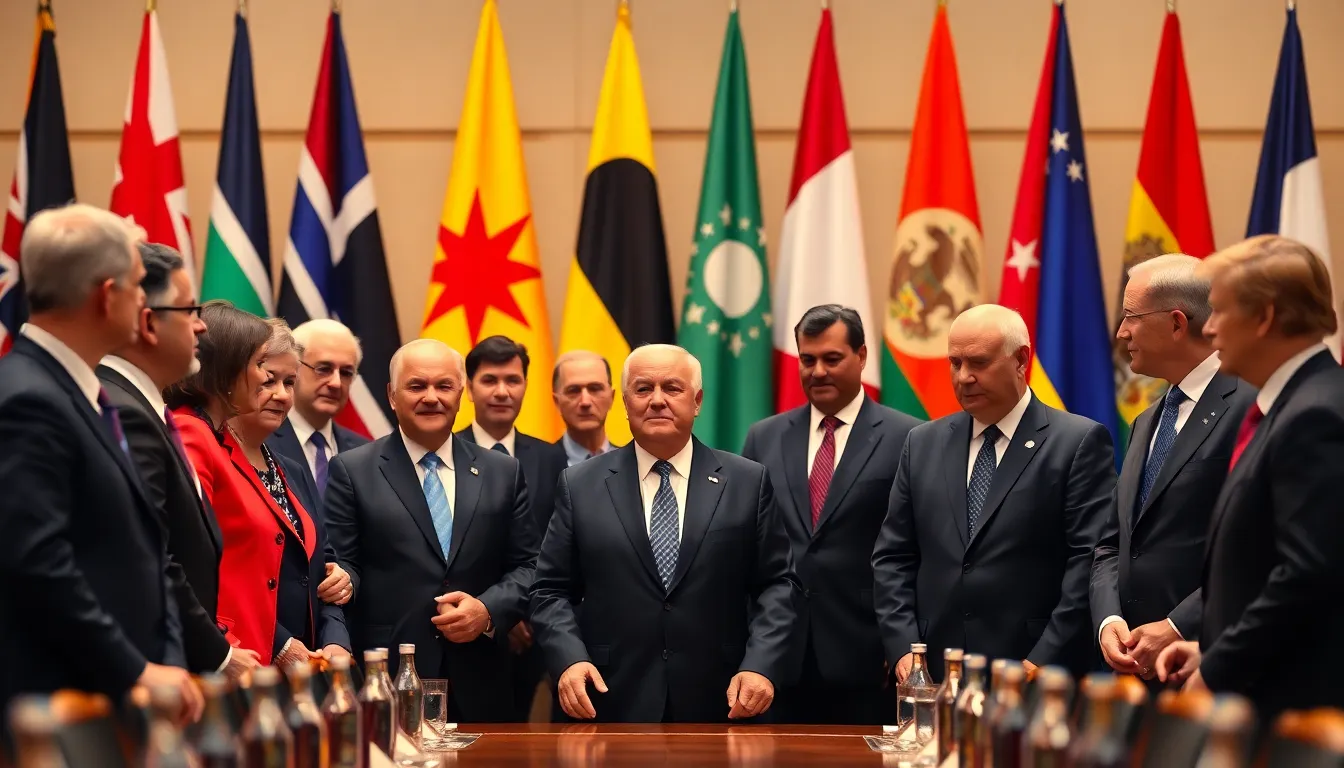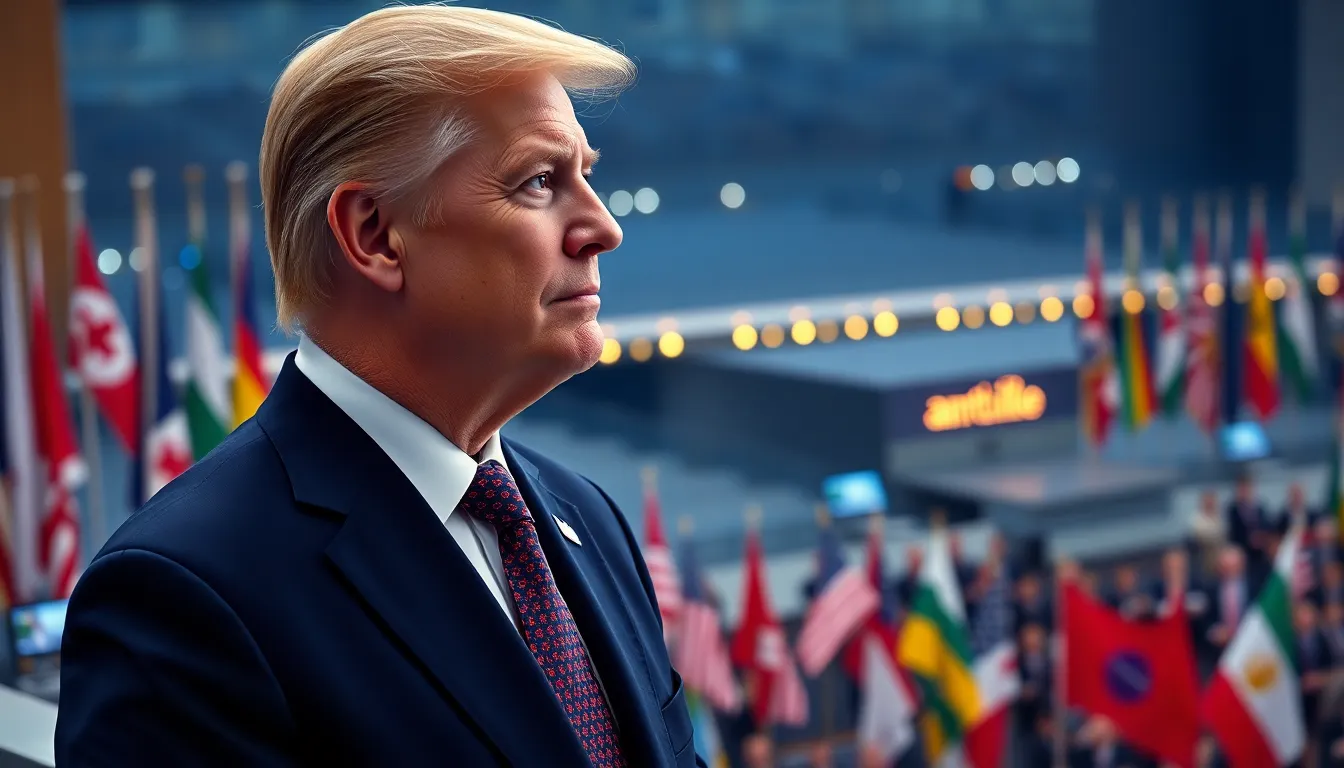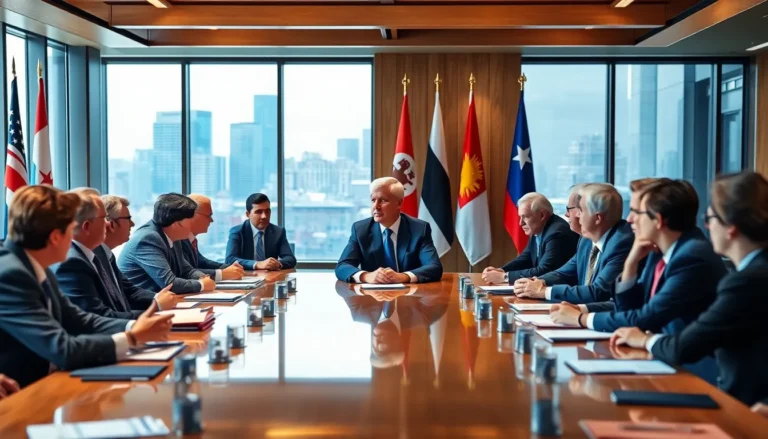Table of Contents
ToggleIn an ever-changing global landscape, staying informed about world political updates is crucial. From shifting alliances to emerging conflicts, the dynamics of international relations can impact economies and societies worldwide. Understanding these developments not only helps individuals grasp the complexities of global politics but also empowers them to engage in informed discussions.
Recent events have highlighted the interconnectedness of nations, where decisions made in one corner of the globe can reverberate across continents. As leaders navigate challenges like climate change, trade disputes, and security threats, the political landscape remains fluid. This article delves into the latest updates, providing insights that shape our world today.
Overview of World Political Updates
World political updates reflect the complexities of international relations and diplomatic interactions. Key developments in various regions shape global dynamics and influence economic policies.
- Shifting Alliances
Nations are realigning their partnerships based on shared interests. Recent agreements between countries in Southeast Asia focus on trade and security, demonstrating a collective approach to regional stability.
- Emerging Conflicts
Ongoing tensions in Eastern Europe impact global markets. Heightened military activities and diplomatic standoffs raise concerns about potential escalations that could disrupt trade routes.
- Climate Change Initiatives
Climate summits promote global cooperation on environmental challenges. Countries are committing to specific emission reduction targets, influencing energy policies and international agreements.
- Trade Disputes
Recent tariffs and trade negotiations alter economic landscapes. Policies enacted by major economies can lead to ripple effects, affecting supply chains and consumer prices worldwide.
- Security Threats
Cybersecurity remains a critical issue in international relations. Heightened awareness of cyberattacks prompts nations to enhance protective measures, impacting diplomatic strategies.
- Human Rights Discussions
International forums address human rights violations. Advocacy by various organizations pressures governments to reform policies, showcasing the global commitment to accountability.
- Elections and Governance
Electoral processes in key countries influence political stability. Upcoming elections in economically significant nations attract global attention, as their outcomes shape future policies.
- Health Diplomacy
Global health initiatives highlight the importance of cooperation in pandemic response. Countries are collaborating on vaccine distribution and shared health resources, reinforcing interconnectedness.
Staying informed about these updates allows for a better understanding of the world’s political landscape and its implications on local systems. Engaging with these developments fosters awareness of how interconnected the world’s nations truly are.
Major Political Events in 2023

2023 witnessed significant political events shaping international relations. Key developments arose from ongoing regional conflicts and major international summits, both influencing global dynamics.
Regional Conflicts
Numerous regional conflicts escalated in 2023, impacting diplomatic relations and economic stability.
- Eastern Europe: Tensions between Russia and Ukraine persisted, with military engagements affecting energy supplies to Europe. The conflict necessitated increased NATO presence in neighboring countries.
- Middle East: Hostilities in Syria and between Israel and Palestine intensified, prompting new diplomatic initiatives aimed at peace negotiations. Regional powers influenced these dynamics, advocating for stability.
- Asia-Pacific: Rising tensions in the South China Sea continued, as territorial disputes attracted international attention. Military exercises conducted by China and joint drills by the United States and allies heightened the risks of confrontation.
- Africa: Conflicts in the Sahel region escalated due to various armed groups. International organizations mobilized efforts to address humanitarian crises and restore order.
International Summits
International summits in 2023 served as platforms for nations to address pressing issues.
- G20 Summit: World leaders convened to discuss global economic stability, climate action, and energy security. The summit facilitated agreements on sustainable development goals and cooperation on green technologies.
- COP28 Conference: Nations gathered to negotiate climate commitments, emphasizing the urgency of addressing climate change. Discussions centered on renewable energy transitions and financial support for developing countries.
- ASEAN Meeting: Southeast Asian leaders strengthened cooperative frameworks to enhance trade and security in response to regional challenges. This dialogue aimed to reinforce partnerships and ensure collective regional stability.
- NATO Summit: Member states emphasized defense strategies and cybersecurity amid growing global threats. New initiatives for military collaboration and enhanced readiness were established during the meeting.
These events illustrate the complex landscape of international relations in 2023, highlighting the challenges and collaborations shaping the world today.
Key Political Figures
Key political figures shape the current international landscape, influencing global dynamics through their leadership and policies. Understanding new leaders and influential political movements offers insights into the evolving political environment.
New Leaders and Their Policies
Newly elected leaders are steering their countries towards significant policy changes. For instance, Lula da Silva in Brazil advocates for environmental protections and economic equality, reversing former policies that prioritized profit over sustainability. In Italy, Giorgia Meloni’s government focuses on immigration control and economic reforms aligning with nationalist perspectives. In India, Prime Minister Narendra Modi continues to implement policies aimed at enhancing India’s global presence while addressing domestic challenges like poverty and unemployment. Each leader’s approach directly impacts their nations and international relations, reflecting shifts in global priorities and alliances.
Influential Political Movements
Political movements are gaining momentum worldwide, reflecting societal changes. The climate movement, led by figures such as Greta Thunberg, emphasizes urgent action against climate change, influencing young voters and shaping policies in various nations. In the US, the Black Lives Matter movement continues to highlight racial injustices, driving discussions on police reform and social equity. The women’s rights movement, particularly in regions like the Middle East, inspires calls for gender equality and advocates against oppressive laws. These movements not only challenge existing political structures but also mobilize citizens and amplify voices demanding change, significantly affecting national and international policy agendas.
Global Implications of Political Changes
Political changes around the world create significant repercussions, influencing economies, societies, and international relations. These dynamics shape not only national policies but also broader global interactions.
Economic Impact
Political shifts directly influence economic stability and growth. Economic sanctions, such as those imposed on Russia, affect trade flows, driving inflation and altering supply chains. Trade negotiations, like those within ASEAN, reshape markets by encouraging regional cooperation and competition. Changes in leadership often bring new fiscal policies that can stimulate investment or restrict it, impacting local and global economies. Recent tariffs on imported goods have resulted in increased prices for consumers and businesses alike, affecting spending habits. Additionally, instability in regions like the Middle East disrupts oil markets, causing fluctuations in energy prices that resonate globally.
Social and Cultural Effects
Political transformations also spark significant social and cultural changes. New policies regarding immigration, for example, impact demographic patterns and cultural exchange. Movements advocating for social justice, such as Black Lives Matter and climate activism, highlight disparities and drive public discourse about equality and rights across borders. Recent elections have seen increased participation of young voters and marginalized groups, signaling shifts in societal values toward inclusivity and representation. Cultural exchanges facilitated by international diplomacy foster understanding among nations, while conflicts can exacerbate tensions, leading to social unrest. Through these developments, a complex web of social identities emerges, reflecting the interconnected nature of global societies and the shared challenges they face.
Future Trends in Global Politics
Future trends in global politics indicate shifts in power dynamics and significant electoral changes. Observing these developments informs understanding of international relations and their broader implications.
Emerging Power Dynamics
Emerging power dynamics shape the international landscape as countries adapt to new challenges. China’s influence continues to expand, particularly in Asia and Africa, as it invests in infrastructure and trade partnerships. Russia seeks to reinforce its geopolitical presence through alliances and military might, especially in Eastern Europe and Central Asia. Additionally, India’s rise as a regional power emphasizes its role in global forums, such as the G20 and BRICS, influencing discussions on climate and trade.
Regional blocs, like the European Union and ASEAN, strengthen their collective bargaining power in response to global economic pressures. These organizations facilitate cooperation on security, trade, and environmental policies, reflecting a trend toward multilateralism. The United States reassesses its global role, focusing on strategic partnerships to counterbalance authoritarian regimes and tackle climate change.
Predictions for Upcoming Elections
Upcoming elections in key nations may significantly impact global politics. The United States’ 2024 presidential election is poised to influence international relationships, particularly on trade and climate policies. Economic recovery and social issues dominate voter concerns, prompting candidates to present clear strategies for engagement on these fronts.
In Europe, elections in France and Germany may reshape the EU’s approach to migration, economic stability, and defense strategies. As political parties adapt to rising populism, voters increasingly prioritize environmental issues and social justice.
Emerging elections in Latin America, particularly in countries like Argentina and Chile, signal a shift toward progressive policies. These elections reflect a growing demand for social equality and sustainable development, likely influencing regional cooperation and trade agreements. Trends indicate that voter turnout among younger populations will also rise, emphasizing the need for candidates to address contemporary issues that resonate with this demographic.
Staying updated on world political developments is essential for understanding the complexities of today’s global landscape. As nations navigate shifting alliances and emerging challenges, the interconnectedness of economies and societies becomes increasingly evident.
Political changes not only shape international relations but also influence local communities and individual lives. With significant elections on the horizon and ongoing geopolitical tensions, the future promises to be dynamic.
Engaging with these updates empowers individuals to comprehend the broader implications of political decisions. By remaining informed, one can better appreciate the intricate web of global interactions that define our world today.





